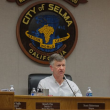What do you do with a watchdog that doesn’t bother to show up for the watch?
That’s the question Fresno voters should ask themselves as they ponder how City Hall’s much-ballyhooed Capital Projects Oversight Board fell into such disrepair – and who among elected officials is responsible.
The volunteer board is supposed to oversee the spending of taxpayer money on big-ticket capital projects such as the southeast surface water treatment plant, bus rapid transit and the restoration of Fulton Street.
But some board members have routinely failed to show up for meetings. It’s gotten so bad that scheduled meetings have been cancelled because the board didn’t have a quorum.
The City Clerk’s website shows that four of 2017’s nine scheduled meetings through June 5 had been cancelled.
Absenteeism has become so systemic that several board members have taken it upon themselves to suggest reforms.
Might those reforms be something along the lines of kicking their lazy or irresponsible or overbooked colleagues off the board?
Nope. The reformers wondered if the board could create some type of subcommittee with the authority to fulfill the duties of the full board.
In other words, create Capital Projects Oversight Board Lite capable of circumventing that pesky quorum rule and the state Open Meeting Law (Brown Act) that goes with it.
To cut to the chase, Deputy City Attorney Brandon Collet at Monday’s meeting essentially told the board to forget it. Collet didn’t say so in exactly those words. But he outlined in detail the legal shortcomings of each of the reformers’ ideas on subcommittees.
The board got the message.
Board Chairwoman Ann Kloose grabbed the entire issue by the neck: “I tabled it.” That ended all debate.
But that probably won’t be the end of the story if board members continue to play hooky on such a grand scale. Perhaps the next debate will be whether board’s purpose has come and gone.
As you will recall, the board is the result of two City Council bills passed in 2015: the Enterprise Accountability and Oversight Act (authored by Lee Brand and Clint Olivier) and the Construction Management Act (Brand).
Brand in May 2015 told me (when I was working at The Bee) that his Construction Management Act “will mean projects will be completed on time and on budget. When that happens, taxpayers benefit, ratepayers benefit and city government is more efficient.”
The board was to be filled with experts in construction finance and management. An especially important part of the board’s mission is approving (or denying) change orders – requests by contractors for more money after a project is underway.
The board was to have nine members. Each council member would appoint one board member. The mayor would appoint two.
City Hall in 2015 was embarking on a handful of multi-million-dollar capital projects. Some of these generated considerable skepticism among voters and ratepayers. It’s no secret that government on occasion has been known to waste money.
The Capital Projects Oversight Board was designed to calm the political waters. The first board meeting was in January 2016. Board members took an oath to do their duty.
The board currently has seven voting members (Council Member Esmeralda Soria is a non-voting member). According to the City Clerk’s Office on Tuesday, there are two vacancies – seats to be filled by appointments from District 3’s Oliver Baines and District 5’s Luis Chavez.
A quorum on a nine-member board is five. If all nine positions are filled and three members don’t show up at a meeting, then the board has six members in attendance and there’s a quorum. The board can do business.
Let’s say three members on a nine-member board with two vacancies don’t show up for a meeting. The other four members get to the meeting on time. There’s no quorum – four out of nine – so no formal business can be done. The meeting is cancelled or the four merely chat among themselves.
Absenteeism was a hot topic at the board’s May 1 meeting (five members in attendance).
According to the meeting minutes, Chairwoman Kloose “stated she supports creating a committee to avoid holding up progress due to our inability to have a quorum. She understands this is bad policy that is unfortunately necessary.”
Vice Chairman Tyler Mackey objected to Kloose’s idea. Mackey said the City Council made a promise to Fresnans when it created the board. The full board is responsible for keeping that promise, Mackey said.
Board Member Joe Garcia asked if taxpayers had been hurt by project delays due to the quorum problem.
According to the May 1 minutes: “Michael Carbajal (Public Utilities’ water division manager) said there was an instance early on where we had a change order that was timely and they made the decision to process that change order without getting the board’s approval first. Then they came back and said that they wanted to present this information to you the board, that’s the one instance. We’ve got three change orders on the agenda tonight, and we’ve been holding one of them for about a month. So the potential does exist. So far it’s been a low risk but the potential is there.”
The board postponed a decision on the quorum issue until the June 5 meeting.
The board at the June 5 meeting (seven members showed up) had three choices:
- “Approve the creation of a sub-committee to hear items before the Oversight Board where less than a quorum is present.”
- “Create a policy to address when a quorum is not established that City staff can move forward with a change order until a quorum is established, then have the approval to be change order be ratified by the Board after the fact.”
- “Leave the process like it is.”
Deputy City Attorney Collet opened things with a concise and powerful review of the relationship of ad hoc subcommittees and standing subcommittees to the state Open Meeting Law. If I understood Collet correctly, an ad hoc subcommittee has such limited authority that it would fail to meet the board’s needs while a standing subcommittee has such strict public-noticing requirements that its operation would be little different than that of the entire board.
As to the other big proposal before the board, it was obvious that at least some members in the five weeks between the May 1 and June 5 meetings had given serious thought to the wisdom letting city staffers approve any and all change orders whenever they felt like it while leaving board approval for the fait accompli to some vague point in the distant future when the full board cobbled together a quorum.
Kloose firmly nipped this idea in the bud.
That left option 3 – leave the process like it is. Kloose’s tabling of the matter was the same as saying the status quo shall reign.
Allow me to give you a sense of what the Capital Projects Oversight Board handles at an official meeting.
One of the action items at the June 5 meeting was a $543,385 change order to the southeast surface water treatment plant.
The treatment plant project’s original contract price was $159 million. The change order before the board would boost the cost of all the project’s change orders so far to $2.1 million. The net percentage change in contract price from the original contract price due to change orders is just 1.3%.
Considering the size and complexity of the treatment plant project, it’s safe to say Director Tommy Esqueda’s Public Utilities Department is doing a great job of protecting the taxpayer’s interests.
The staff report began its explanation of the need for the additional money like this: “This Change Order No. 9 incorporates the following modifications which together comprise the addition of a Calcium Hydroxide chemical feed system to manage treated water quality: 1) Add mixers to the two Caustic Soda Tanks; 2) Add a tap on the Raw Water Pipe for future connection to the CO2 system; 3) Add electrical and instrumentation for mixers on two Chemical Storage Tanks;….”
The explanation had 10 such tidbits of information.
The nearly $1 billion (including purple pipe system) Recharge Fresno project is chock full of complex engineering jobs, any one of which might occasionally require a change order not all that different from Change Order No. 9.
In addition to Recharge Fresno, you’ve got the Fulton Corridor and Bus Rapid Transit projects. Neither is a piece of cake when it comes to engineering.
I’ve attended only a handful of Capital Projects Oversight Board meetings. Some of the faces on the board have changed. For example, Al Solis, City Hall’s former planning director and one of the city’s top land-use consultants, took the oath as a new board member on Tuesday (he was appointed by District 4’s Paul Caprioglio). All of the board members I’ve seen in action have taken their duties seriously. They deserve the public’s gratitude.
But I can see how the board could develop attendance problems among its members. Simply put, the members have been asked by the City Council and the Mayor’s Office (Ashley Swearengin until January 2017, Brand now) to do too much. It’s not fair to expect board members to be as knowledgeable as Water Division Manager Carbajal about a treatment plant’s calcium hydroxide chemical feed system. And if board members don’t have that knowledge, then what’s the value to taxpayers and ratepayers of their “expert” approval of the change order?
AEveryone is just going through the motions – and everyone knows it. It’s not fair to put board members and city staffers with busy schedules through a public relations exercise that might have made sense two years ago in the heat of political battle but whose worth has faded.
More importantly, it’s not a smart way to treat the public’s trust.
City Hall has been building big things for more than a century. City staffers – answerable to elected officials committed transparency in government and protection of the public purse – have been competently handling change orders for more than a century.
Perhaps it’s time to return to that version of the status quo.










